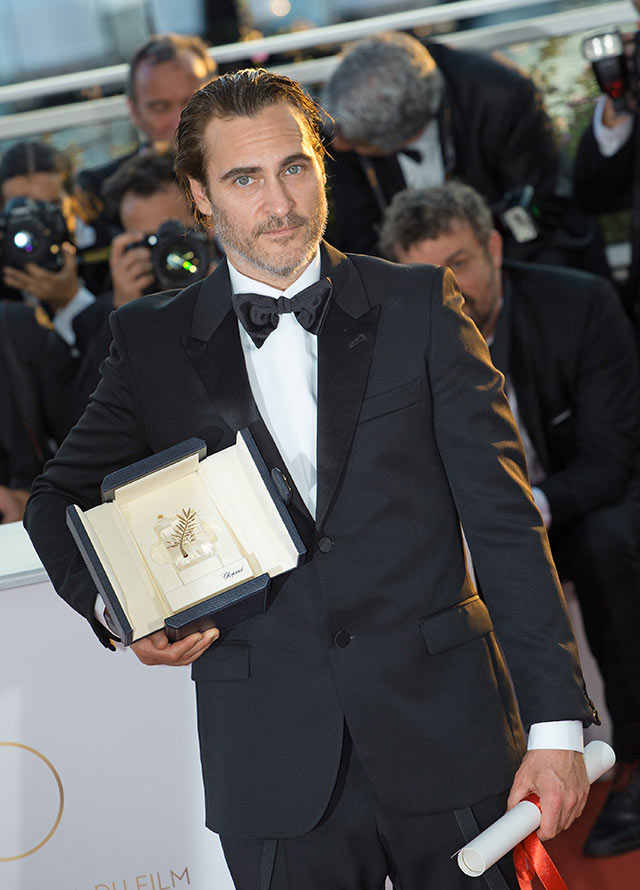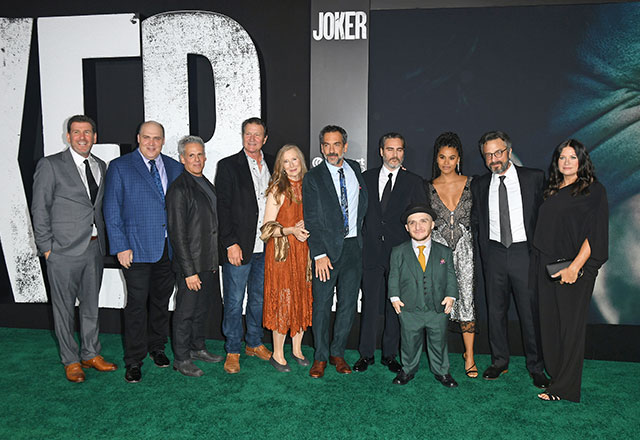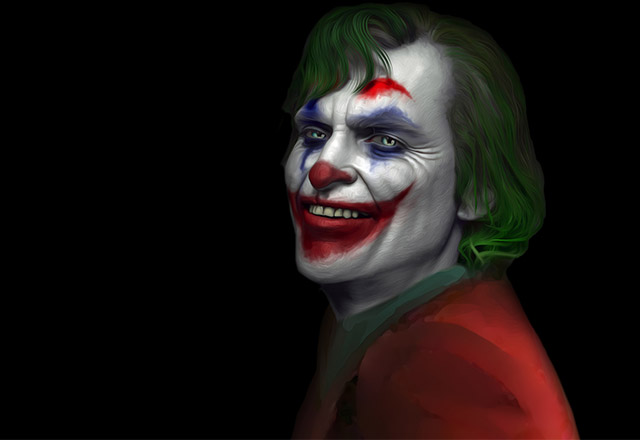
Joaquin Phoenix has long been one of the most enigmatic actors in Hollywood. He first soared to fame opposite Russell Crowe in The Gladiator and then as Johnny Cash in Walk the Line, earning two Oscar nominations in the process. Then he came close to self-destructing following an ill-advised attempt to create a fake celebrity version of himself (as part of a documentary concocted by Casey Affleck) and a disastrous 2009 appearance where he mumbled and appeared stoned on David Letterman and during which the latter dismissed him as the “unabomber.”
But Phoenix rose from the ashes with another Oscar-nominated turn in The Master and critically acclaimed performances in Inherent Vice and Irrational Man. Now his resurrection is complete with a bravura turn in Joker, the anti-superhero film that has created a sensation.
The film is already drawing notice as a possible Oscar contender on the back of Todd Phillip’s brilliant direction and Phoenix’s deeply-layered and tortured interpretation of the classic comic-book character with the clown make-up and maniacal laugh. Interestingly, the 44-year-old actor felt that he needed to focus not on Arthur Fleck/Joker’s tormented nature, but on his more hopeful side.
“This has been my most difficult role,” Phoenix says. “What was interesting is that most of my work involved the search for the light in Arthur. I was not only interested in his torments but also in his struggle in the pursuit of happiness, in his need to be loved, and to feel connected to the world. That’s the side of him I wanted to explore. I never saw him as a purely tormented man – he was so many things.”
“The man who we see at the beginning of the shooting became totally different at the end. The character evolved continuously, and the more unpredictable he was, the better it was…I’ve never had a character like this, one who was constantly evolving,”
The star also lost over 50 pounds to play the Joker, whom Phoenix plays as a failed stand-up comedian turned criminal. The massive weight loss also caused the actor considerable psychological distress. Said Phoenix: “The weight loss, as it turns out, affects your psychology. You start to go mad when you lose that amount of weight in that amount of time.”
Phoenix was looking happier and more ebullient than ever while promoting the film in Venice and Toronto. He is also enjoying what appears to be a serious relationship with actress Rooney Mara. The couple have been seeing each other for the past year and recently revealed that they are engaged to be married.
While attending TIFF, Phoenix was given a special Tribute award. In his acceptance speech, he recalled how his late brother River Phoenix (who died from a drug overdose in 1993) had inspired him to become an actor: “When I was 15 or 16 my brother River came home from work and he had a VHS copy of a movie called Raging Bull and he sat me down and made me watch it. And the next day he woke me up, and he made me watch it again. And he said, ‘You’re going to start acting again, this is what you’re going to do.’ He didn’t ask me, he told me. And I am indebted to him for that because acting has given me such an incredible life.”
“It was important for me to reveal the joy of the Joker, his desire to express himself, to be happy”
What made you finally decide to play the Joker given your initial hesitation about taking on a role that has previously been defined by Jack Nicholson and Heath Ledger in the Batman films?
JOAQUIN PHOENIX: It was Todd’s [Phillips] personal approach to the film and to the character, and his independent sensibility and desire to make a unique film and give me the creative freedom that every actor wants. I needed to build this character on my own, working with Todd, and I didn’t imitate any previous interpretation and neither did I deliberately distance myself from anyone else’s Joker. I only thought of doing mine. This Joker is simply ours.

Did you have a specific plan or vision when it came to creating the character?
JP: It was a long process. We actually chose not to follow the initial approach we had developed because we came to see that defining the Joker in very specific ways would betray his nature and his elusive spirit.
It’s a difficult character to define, so I wouldn’t want to define him. I would never want a psychiatrist to really understand what kind of patient he had in front of him. I have to admit though that initially I was confused, but one day Todd sent me a text with some references and ideas that clarified things in my head. Suddenly I understood what I needed to do.
What kind of psychological profile did you try to bring to Arthur Fleck and his transformation into Joker?
JP: To get really into him, I focused on the concept of loss, both emotional and physical, and I lost a lot of weight to that end. I often tried to establish key points of his identity, but every time I thought I had come up with certain answers, I needed to take a step back. I wanted to leave an aura of mystery about it. Joker has a boundless personality, difficult to probe. I kept digging inside him I found new things until the very last day of filming.
Did you read any psychology or psychiatric studies in your preparations?
JP: My overall belief was that to understand who he was and to define him. I read, in particular, a book that subdivides the various human personality types, but I didn’t want to create a specific psychiatric type or specific personality. Joker is not a precise personality and, in that way, I had the freedom to interpret something that can’t be identified or categorised.

You’ve mentioned that laughter was one of the keys to creating the character and giving him a unique identity?
JP: It wasn’t easy to find the perfect evil laugh…Even before the script was finished, Todd told me what he wanted to express through his laughter. He saw the Joker’s laughter as something which expressed his pain that comes with the happiness inside him which tries to emerge but is suffocated and frustrated. Initially I didn’t think I was able to do it. I didn’t want it to be ridiculous.
And I absolutely didn’t want to play the character so that you only saw the image of a tormented madman. It was important for me to reveal the joy of Joker, his desire to express himself, to be happy.
“The Joker’s laughter became my obsession.”
Did you do specific research on types of laughter?
JP: In my first meeting with Todd he showed me videos of people laughing that way because they are suffering from a clinical disorder. That maniacal laughter seemed to me to be a repressed emotion, a part of the personality that was trying to come to the surface.
The Joker’s laughter became my obsession. So much so that I called Todd back and asked him to seriously judge if I could replicate that sound. I practically made a new audition based only on laughter. It was vital for me to be able to prove myself to Todd and to myself, and he as the director worked with me and offered me his precise and ongoing evaluation. It was a long and embarrassing experience for both of us, but indispensable.
You have often played very different psychological types and occasionally extreme characters in your career. Do you look for a certain amount of chaos?
JP: There has to be something that pushes me to commit myself in a very serious way. I like the unpredictable and unknowable sides of a character, as well as the possibility of failing at the job.
My life is simple and straightforward, so I’m searching not for clarity but for complexity in the characters I play.
Do you often go through an intense process of examination before deciding on taking on a specific film project and character?
JP: I always take a lot of time and consideration when I make decisions about what I will work on. The process obviously consists of reading the script and meeting the director and then continuing to have meetings and discussions.
That’s the kind of process I had with Todd. He has a very interesting understanding of our world and what he’s trying to say in his films, and there was something very impressive about working with him on this particular project.
I feel it as if we’ve created something unique, which is somehow a world apart. What I was most worried about while making the film was this fear I had that something of me that I don’t like might emerge, that was the thing that scared me the most.
“My life is simple and straightforward, so I’m searching not for clarity but for complexity in the characters I play.”

Did you feel the pressure of living up the expectations connected with reviving the Joker?
JP: Taking on this character and being part of this film…is a magnified version of what you have to do in acting in general. So, when you get a script, you of course discuss it with the screenwriter who is usually the director in many of the films I’ve done. They have their expectations of the character and they have been imagining things in their minds for several years, imagining different actors in the role.
And, suddenly, you accept the role and you experience this moment of anxiety where you ask yourself: “Will I be able to live up to their expectations?” But I can’t consider who they wanted before you or what their vision of the movie was six months ago, it’s about now. And at some point, you just have to make it your own and find your own way!
INTERVIEW BY WENN
PHOTOGRAPHS: GETTY, SHUTTERSTOCK![]()











































